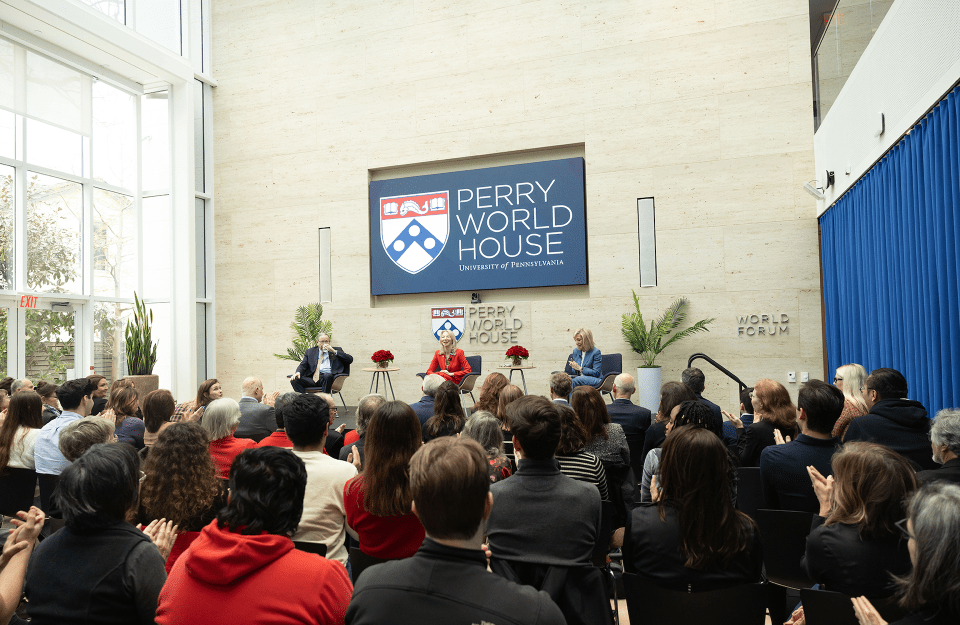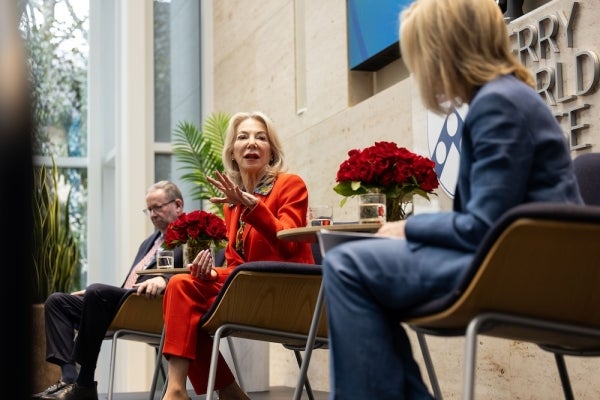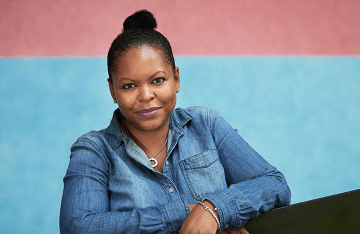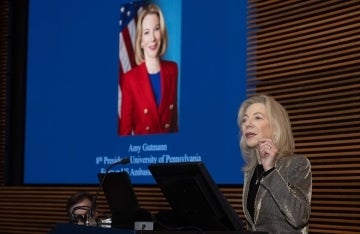Penn Leaders-Turned-Diplomats Reflect on American Statecraft and Foreign Policy
In a conversation at a Perry World House event on ‘Common Sense Diplomacy,’ President Emerita Amy Gutmann and former trustee chair David L. Cohen shared insights and experiences.

(Photo: Eddy Marenco)
Penn President Emerita Amy Gutmann, newly credentialed U.S. ambassador to Germany, was in the back seat of an armored Audi A8 blasting down the Autobahn between Berlin and Munich at more than 110 miles per hour.
It was February 2022, and she was enroute to a meeting with the German chancellor to persuade the Germans to build up their military and end oil and gas alliances with Russia in advance of a suspected invasion of Ukraine.
They made it to the meeting, but barely. Shortly afterwards, Germany took a firm stand on behalf of Ukraine and has remained a key U.S. ally in Europe.
Gutmann recounted the experience, at a forum at Perry World House reflecting on her tenure representing U.S. interests in Germany and on the role of ambassadors in international diplomacy. “That’s the moral of this little story,” she said, “There really isn’t time to spare these days.”
The event, titled “Common Sense Diplomacy,” featured Gutmann and former U.S. ambassador to Canada David L. Cohen, a Penn Carey Law alum, former Comcast executive, and former chair of Penn’s Board of Trustees.
“Perry World House is Penn’s hub for global engagement,” said PWH deputy director Michael Weisberg. “But very importantly for today, it is one of the manifestations of Ambassador Gutmann’s vision and strategy to connect Penn to the world and the world to Penn.”
“I like to think of this extraordinary place as the house that Amy and David built,” quipped event moderator Andrea Mitchell about Perry World House, which opened in September 2016 during Gutmann and Cohen’s terms as president and board chair. Mitchell, a Penn alumna and trustee emerita, who founded the Andrea Mitchell Center for the Study of Democracy, is chief Washington correspondent and chief foreign affairs correspondent for NBC News.
In their service as ambassadors, Gutmann and Cohen were carrying on the tradition of Penn founder Benjamin Franklin, who served as the fledgling nation’s first ambassador, as minister to France, said President J. Larry Jameson in introducing the pair.
An ambassador, Cohen said, is the highest-ranking official representing the United States to another nation, aside from the president. They communicate messages from Washington, D.C., to the host country and vice versa. And they oversee the work of U.S. diplomats in the country.
But there’s also a personal connection between the country and the ambassador, said Cohen, who journeyed widely across Canada during his tenure. “One of the reasons I traveled as much as I did and became known by literally tens of thousands of Canadians on a personal basis is because I could then have real, personal conversations to be able to articulate what Canada was feeling,” he said.
Some ambassadors come from the U.S. foreign service, while others are business leaders, politicians, or educators. For some, Gutmann said, a posting is personal, as it was for her. “My father, Kurt Gutmann, escaped from Nazi Germany in 1934, and he got his whole family out in ’37-39. Germany was our arch enemy then,” she said. “Because of the Marshall Plan, because of the great diplomacy of presidents and secretaries of state and of career diplomats, it’s become such a strong ally.”
Mitchell asked about the role of envoys, who are specially appointed by a president to handle more ad hoc situations or negotiations. Cohen observed that it’s a “matter of degree,” saying that being Senate-confirmed as an ambassador gives someone “special cachet and special clout within your host country that an envoy just doesn’t and can’t have.” Gutmann said that while she had to navigate tricky policy situations, she was never blindsided by an envoy or policy change. “Every time I was speaking and working to advance American values and interests in Germany, I knew what the administration I was working for and stood for in any given time,” she said.

Both voiced concerns about the current erosion of diplomatic relationships. However, they remained hopeful and said that despite recent rhetorical and policy shifts by the Trump administration, they don’t believe that relationships between the U.S. and Canada and Germany are irrevocably broken, but it will take some work to get back to normal. For example, the public support from Vice President J.D. Vance and Elon Musk for the right-wing Alternative for Germany party, which lost in the most recent elections, will “take a lot of diplomacy and a big sea change in our politics at the top for the Germans to get over,” Gutmann said.
“It’s alliances that keep the world together,” Cohen said. “There are enough leaders in the United States, there are enough leaders in Germany, there are enough leaders in the EU, there are enough leaders in Canada that still believe in what the U.S.-led alliance stands for. When things happen like what are happening [now], it’s a time for alliances to be even more important and for people to look for even more ways to work together.”
“We all have agency,” Gutmann said, mentioning a civil society initiative Stand up and Speak Out that she started as ambassador, standing for democracy and against antisemitism, Islamophobia, and all forms of hatred. “That is going to last no matter who is president,” she said.
“We all have voice, and we can use it,” Gutmann said, encouraging all American’s to be ambassadors and to “speak up for constitutional ideals of liberty and justice for all,” noting “those values are what our Canadian and German partners and allies really admire and want to emulate.”



